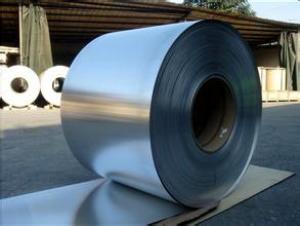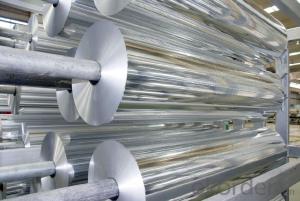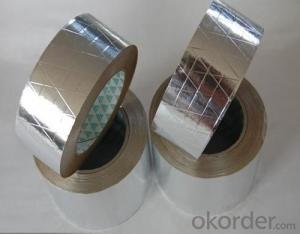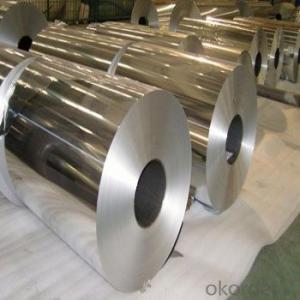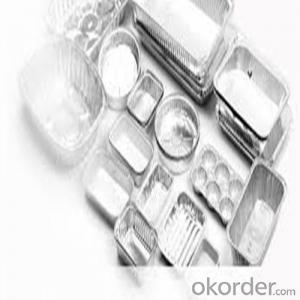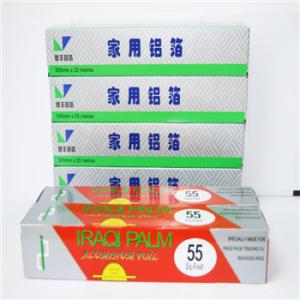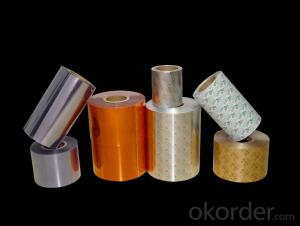Jumbo Aluminum Coil Roll - Aluminium Products
- Loading Port:
- China Main Port
- Payment Terms:
- TT OR LC
- Min Order Qty:
- -
- Supply Capability:
- -
OKorder Service Pledge
Quality Product, Order Online Tracking, Timely Delivery
OKorder Financial Service
Credit Rating, Credit Services, Credit Purchasing
You Might Also Like
Alloy: 1235/ 8011/ 8079
Temper: H14/H16/ H24/ H26
Thickness: 0.28mm-0.3mm(±0.01mm)
Width: 1000mm-2020mm(±1mm)
Core I.D:405/505/508mm
Standard: GB/T3198/ ASTM-B209
SURFACE QUALITY: GOOD APPEARANCE WITH NO-CRACK AND WELL-DISTRIBUTE GRAIN.
BUILD UP: TIGHT SLIT EDGES FREE FROM CRACKS, LAYER TO LAYER SHIFT NOT MORE THAN 2MM.
PROFILE: -0/+1%
FLATNESS: MILL FLATNESS COIL HAVING EDGE WAVINESS RATHER THAN CENTER BUCKLES SHALL BE ACCEPTABLE.
ROLLING PERFORMANCE: RE-ROLLABLE TO THE FINAL DESIRES GAUGES
- Q: Why is the hard drive made of aluminum? Why is steel not used, despite being cheaper?
- The actual disks are made from an aluminum substrate. Aluminum is the best choice for minimizing the inertia of the disk pack, which reduces the energy required to spin it. A steel pack would use much more energy. Many other materials, magnets, copper, gold, oxides, diamond like coatings, insulators are inside disk drives
- Q: How do aluminum coils contribute to energy-efficient lighting installations?
- The energy efficiency of lighting installations is greatly enhanced by the use of aluminum coils. Firstly, aluminum, being highly conductive, effectively transfers heat away from the lighting system. This prevents heat accumulation, which can negatively impact the performance and lifespan of the lighting fixtures. By effectively dissipating heat, aluminum coils ensure that the lights operate at their highest efficiency by maintaining optimal operating temperatures. Furthermore, aluminum coils are lightweight, which makes them easier to handle and install. This reduces the overall weight of the lighting fixtures, making them more convenient to mount and manipulate during installation. The reduced weight also leads to lower energy consumption during transportation and installation, thus promoting long-term energy efficiency. Additionally, aluminum coils are highly durable and resistant to corrosion, making them ideal for lighting installations exposed to various environmental conditions. This durability reduces the need for frequent replacements or repairs, resulting in lower energy consumption associated with maintenance. Moreover, aluminum is a recyclable material, meaning that the coils can be easily reused or repurposed at the end of their life cycle. Recycling aluminum requires significantly less energy compared to producing new aluminum, leading to a reduced carbon footprint and overall lower energy consumption. In summary, aluminum coils offer numerous benefits in terms of energy efficiency for lighting installations. Their efficient heat dissipation, lightweight nature, durability, and recyclability contribute to optimized performance, reduced energy consumption, and a more sustainable lighting solution.
- Q: What are the factors that affect the cost of aluminum coils?
- There are several factors that can affect the cost of aluminum coils. 1. Raw material costs: The cost of aluminum, which is the primary material used in manufacturing coils, can fluctuate based on global supply and demand as well as market conditions. Changes in the price of aluminum can have a direct impact on the cost of aluminum coils. 2. Manufacturing process: The production process involved in making aluminum coils can also impact their cost. Various techniques such as casting, rolling, and annealing are used, and each method has its own associated costs. The complexity and efficiency of the manufacturing process can influence the final price of the coils. 3. Size and specifications: The size, thickness, and specifications of the aluminum coils can affect their cost. Larger coils or coils with specific dimensions may require additional raw materials, processing time, or specialized equipment, which can contribute to higher costs. 4. Surface finish: The type of surface finish applied to the aluminum coils can also impact their cost. Coils with a higher-quality finish, such as brushed or coated surfaces, may be more expensive due to the additional processing and materials required. 5. Quantity and order volume: The volume of aluminum coils ordered can often impact the cost. Larger order quantities may lead to economies of scale, resulting in lower unit costs. Conversely, smaller orders or customized specifications may incur additional setup costs or higher per-unit prices. 6. Market competition: The level of competition in the aluminum coil industry can affect pricing. If there are numerous manufacturers offering similar products, prices may be more competitive as companies strive to attract customers. On the other hand, if there are limited suppliers or unique product offerings, prices may be higher due to reduced competition. 7. Transportation and logistics: The cost of transporting aluminum coils can also influence their overall price. Factors such as distance, mode of transportation, and fuel prices can impact shipping costs, which in turn can be passed on to customers. It is important to note that these factors are not exhaustive and can vary depending on the specific circumstances and market dynamics. Additionally, other external factors such as taxes, tariffs, and government regulations can also affect the cost of aluminum coils.
- Q: Are there any certifications or standards for aluminum coils?
- Certifications and standards exist for aluminum coils, ensuring their quality and performance. The Aluminum Association's Certification Program is widely recognized as the most prominent certification for aluminum coils. This program guarantees that the coils meet the specific standards and requirements established by the association. Moreover, multiple organizations such as ASTM International, ASME, and ISO have set various standards and specifications governing the manufacturing and performance of aluminum coils. These standards encompass crucial aspects like the coils' chemical composition, mechanical properties, and dimensional tolerances, guaranteeing compliance with industry requirements.
- Q: Can aluminum coils be used for roofing?
- Yes, aluminum coils can be used for roofing. Aluminum is a popular and commonly used material for roofing due to its durability, lightweight nature, and resistance to corrosion. It is often chosen for its ability to withstand harsh weather conditions and its long lifespan, making it a suitable option for various roofing applications.
- Q: Can aluminum coils be used for HVAC condenser coils?
- Yes, aluminum coils can be used for HVAC condenser coils. Aluminum is a popular choice for condenser coils due to its excellent heat transfer properties, durability, and resistance to corrosion. Additionally, aluminum coils are lightweight, making them easier to install and transport.
- Q: Can aluminum coils be used for automotive heat shields?
- Automotive heat shields can indeed utilize aluminum coils. Aluminum, known for its outstanding thermal conductivity and high melting point, is frequently employed as a heat shield material. Its lightweight nature and remarkable resistance to corrosion make it particularly well-suited for automotive purposes. By effortlessly molding aluminum coils into the desired configuration, effective heat insulation can be attained, safeguarding delicate components from the engine or exhaust system's excessive heat. Moreover, aluminum is cost-efficient and easily accessible, contributing to its widespread preference as an automotive heat shield material.
- Q: Aluminum silicate felt fiber needle blanket noise reduction?
- Aluminum silicate needled blanket belongs to the porous material, porosity higher than ninety-six percent in noise reduction has an absolute advantage, because the aluminum silicate needled blanket belongs to soft products, the lack of stress in the industrial application, so there is no large-scale promotion, mainly used in the silencing device of heavy trucks, trucks and cars. And in the heat insulation, aluminum silicate needled blanket technology with a special one-time plastic molding, as the car chassis fireproof heat insulation layer, and now Xiamen Kinglong has reached a cooperation agreement.
- Q: Does anyone know of any men's deodorant that doesn't contain aluminum? It has to be strong, as I do sweat a lot.
- Neways - works really well. Only thing is, you need a local distributor. But ring the company, I am sure it will help you.
- Q: Is it possible to utilize recycled aluminum coils for a project instead of purchasing new ones?
- <p>Yes, you can use recycled aluminum coils in your next project instead of buying new ones. Recycled aluminum is environmentally friendly and often more cost-effective. It maintains the same properties as new aluminum, making it suitable for various applications. Ensure the recycled coils meet the quality standards required for your project. Check for any impurities or damage that might affect performance. Using recycled materials not only reduces waste but also conserves resources.</p>
Send your message to us
Jumbo Aluminum Coil Roll - Aluminium Products
- Loading Port:
- China Main Port
- Payment Terms:
- TT OR LC
- Min Order Qty:
- -
- Supply Capability:
- -
OKorder Service Pledge
Quality Product, Order Online Tracking, Timely Delivery
OKorder Financial Service
Credit Rating, Credit Services, Credit Purchasing
Similar products
Hot products
Hot Searches
Related keywords
